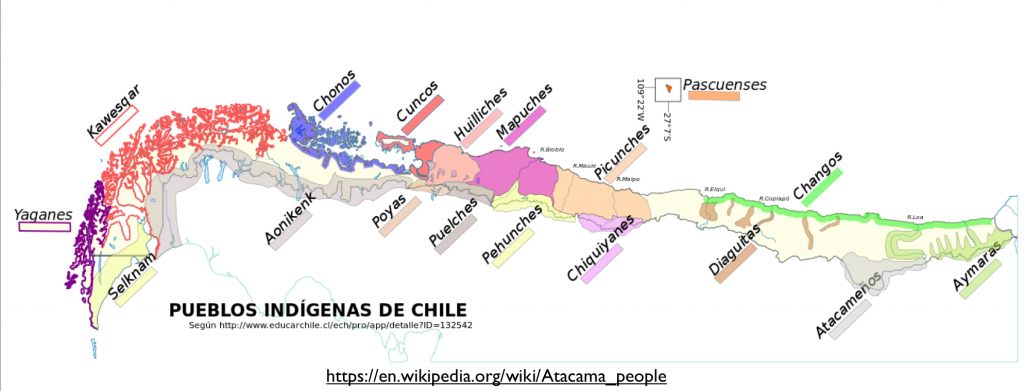by Raúl Zibechi
The proposal of plurinationality, which promotes the construction of a plurinational state, had broad support to overcome the asymmetries between the nation-state and the indigenous nations and peoples. However, this current is in stark decline, while the other current that runs through the peoples in movement, the autonomist current, continues its slow but steady growth.
The proposal was born in the 1980s at the hands of peasant-indigenous organizations in Bolivia and Ecuador, in the midst of processes of struggle that demonstrated how the State violently contained the demands and mobilizations of the native peoples. The plurinational State formula was considered sufficient to solve these problems and was adopted in the 2008 Ecuadorian and 2009 Bolivian constitutions.
However, so far it has not been adopted by most of the peoples demanding territory and who organize to recover those living spaces. The decline of this current stems from two processes: the growing weakness of the States in the face of capital, and the concrete experience in the two countries mentioned above, where there has not been the slightest re-establishment of the State, proving that they are in fact colonial and patriarchal constructions.
The central problem is that plurinationality implies that it is the State that recognizes that there are different indigenous nationalities and cultures living in the same territory. The proposals to move towards an administration of justice according to the ways of the original peoples have never worked, nor is it possible for them to do so, since the logic of the nation-state continues to be dominant.
Not to mention the armed forces and the police, which are the hard nuclei of the state apparatus, where the logic of the people has never had the slightest roots. For 13 years in Bolivia and 10 years in Ecuador, when Evo Morales and Rafael Correa governed, no substantial progress was made in what was promised to be the re-founding of the State. Therefore, the question arises: is it possible to re-found a colonial and patriarchal institution?

Bolivians María Galindo and Silvia Rivera Cusicanqui agreed a year ago that if the armed forces are not dissolved there will be no plurinational State (https://bit.ly/3qjnzGy). It was just a change of name, they say, without any change in the political, economic and symbolic power structures.
At present, the issue of plurinationality is being debated by sectors of the Mapuche peoples in Chile and the Aymara in Bolivia.
The first Meeting of Intellectuals of the Aymara Nation, held at the El Alto Public University last July, concluded that the Political Constitution of the State, in effect since 2009, is an instrument of the colonial State, which does not respond to the reality and interests of the Aymara people (https://bit.ly/3RtGavB).
The declaration of the meeting assures that the objective is the reconstruction of the Aymara nation and the original nations, under the principle of federalism and their own political system, based on the communities (ayllus) and the regions (markas and suyos), without the intervention of the dictates of the institutionalized democracy of the State.
Felipe Quispe, who, during the coup regime of Jeannine Áñez, was at the head of the peasant-indigenous mobilization, which made possible the call to elections won by the Movement Towards Socialism, was a militant in this movement. He also has the sympathy of Vice President David Choquehuanca, who supported the meeting of Aymara intellectuals.
On June 10th in Chile, the spokesman of the Arauco Malleco Coordination (CAM), Héctor Llaitul, prisoner of the Chilean State, pointed out during the inauguration of a community center in Peñalolén (Santiago), that in the last 30 years he had never seen a single Mapuche banner asking for plurinationality, and reaffirmed that the demands are always for territory (https://bit.ly/3D6IhRS).

In an open letter of the CAM, dated August 8, it is stated that plurinationality, as a proposal for the Mapuche cause, turns out to be a measure empty of territorial power and with no prospect of transformation, since it is rather an academic invention of an elite that seeks spaces and quotas of power without taking into consideration the reality of injustices or the real needs of our people (https://bit.ly/3D0UCqr).
One of the reasons that lead them to reject the creation of a plurinational State, and insist on territorial recoveries, is that the conditions of big capital and colonialism that have operated to dispossess us of our territory have deepened in recent decades. A reality that operates throughout the Latin American region.
I believe that we are in the twilight of the plurinational state project. Experience has shown that they are more of the same, just a way of patching up illegitimate institutions, but always without touching their hard cores.
This article was published in La Jornada on Friday, September 9, 2022. https://www.jornada.com.mx/2022/09/09/opinion/019a1pol. English translation by Schools for Chiapas.
